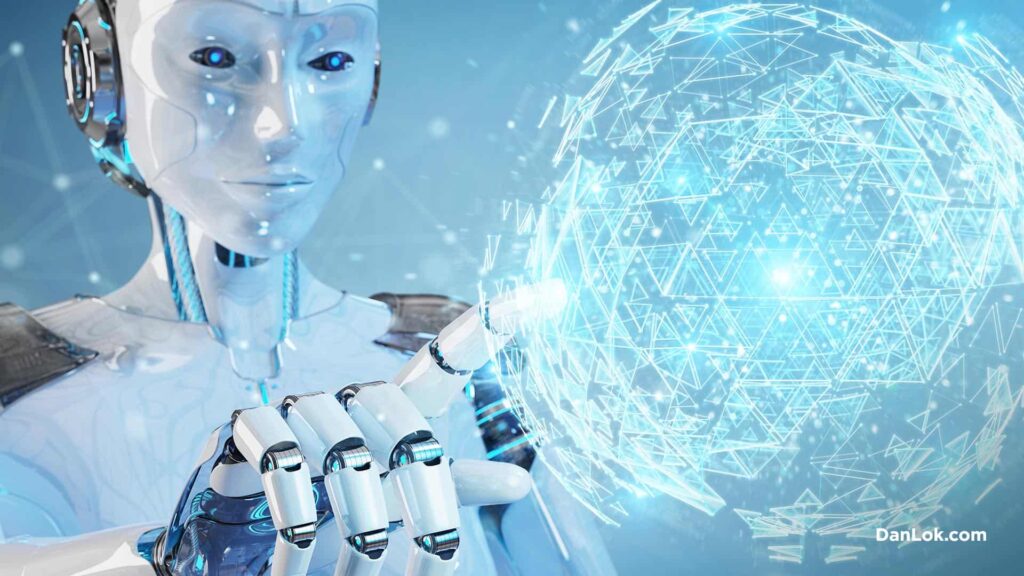What does AI mean to you?
Do you think of Terminator or the power of humanity’s creations? Are you scared or excited? Is it confusing or clear?
AI, for many, has become a catchphrase.
General statements about the future mean very little. Wouldn’t you agree?
You don’t need a grand explanation of the possibilities of AI in the future. And you certainly don’t need a dire prediction about AI taking jobs away.
What you do need is a clear understanding of AI today and the best way to adapt to the changes it will bring to our world.
Overview of the AI industry
You may be wondering, exactly what is AI?
AI, short for artificial intelligence, is tasks that are performed by a machine or by a program that requires some element of intelligence to complete.
The AI industry is focused on building machines that complete projects or solve problems that normally would require human intelligence.
The field of artificial intelligence was actually founded way back in 1956. But our fascination with the way the brain works has existed long before the beginning of the official industry. Philosophers have tried to categorize human action. Scientists have studied systems behind the way we think. Everyone has wondered at a psychological trick or two.
While the buzz around the topic has only become mainstream in the past decade, AI has existed longer than most people realize.
The AI Industry Today
How immersed in AI are you?
Actually, if you’ve used Siri or Alexa today, you’ve already interacted with AI.
Other examples of the AI industry at work today include:
- Augmented reality (real-to-life experience through a set of goggles)
- Chatbots (website AI that starts conversation with customers)
- Self-driving cars (allows drivers to relax and enjoy the trip)
- Amazon’s transactional AI (gives users suggestions based on past purchases)
- Google Nest (regulates temperature, lights, and other simple household elements)
- Pandora’s music AI (finds related music based on 400 preset qualities)
Have you used any of these common AI technologies recently? We all have. Our day-to-day life has been completely transformed whether we realize it or not.

What AI Means for Individuals
We can’t get beyond the fact that artificial intelligence is advancing rapidly. It’s transforming our world right under our noses.
Watch this video where Dan Lok shares 7 jobs that will disappear in the next 20 years due to AI (and what you can do about it).
As you can see, technology in general has replaced many jobs that required humans with computers.
Remember cashiers at the store? Now, we have automated checkouts.
Remember agents at the airport? Now, we have kiosks to handle practically everything.
Artificial intelligence is also infiltrating jobs held by:
- Factory workers
- Phone operators and telemarketers
- Bank tellers and clerks
- Warehouse stockers and packers
- Stock traders
- Bomb technicians
- Surgeons
- Hotel staff
It makes sense why most people fear AI will take over all jobs.
Here’s the bright side: even if AI replaces many jobs that we know today, it will also create new opportunities. This is the way every technological advancement in the past has worked as well.
Even if AI replaces many jobs that we know today, it will also create new opportunities. - Dan Lok Share on X
Back when Elias Howe invented the sewing machine, seamstresses boycotted the idea. One sewing machine could replace the work of up to 10 women. Yet the invention of the sewing machine only made the fashion industry more profitable. It’s created more jobs, not less.
Yes, those jobs were different from the ones required before the machine. The end result was not less work but more.

How to Adapt to the AI Industry
AI has the potential to change the job market in a similar way to the sewing machine. However, its impact will be ten times greater.
How should you approach AI?
It’s not just about the jobs that will be replaced. It’s about your future career opportunities and income potential.
Want to stay ahead of the curve? Dan Lok has put together several ways you can do just that.
Try these approaches as you work to stand out while AI changes our world:
Learn to operate computers.
In many cases, a machine doing its job will need a human to regulate it.
Why not focus on learning as much as possible about these machines and how to operate them?
The seamstresses who succeeded best in the era of the sewing machine were the ones who started using it. In the same way, the job seekers who stay ahead of the curve in the next decade will know how to manage AI.
If you’re working for a company just starting to invest in AI, take the time outside work to do the research into the technology. Don’t miss a chance to learn and operate it. Be the first person to offer yourself as the company integrates artificial intelligence into its daily process.
Even if you don’t want to be at your current job forever, your understanding of the technology behind AI will be invaluable to your career. If you start your own company someday or quit your current career to pursue something new, you’ll only benefit from having a basic understanding of AI technology.
The majority of people will just sit around and accept that their job is being stolen from them by AI. You can be better than that. Instead, focus your attention on becoming a master of the AI industry in the space where you work.
Invest in innately human skills.
Artificial intelligence is quickly overtaking easily automated jobs. These jobs often require repeated tasks rather than complex problem solving.
You can be disappointed by this, or you can take the opportunity to invest in skills that humans can do far better than robots.
In the end, AI taking the mundane tasks off your plate should only help you build your career in a more efficient, better organized way.
As more and more artificial intelligence is entering into the world, more and more emotional intelligence must enter into leadership. - Amit Ray, AI scientist Share on XWhat are the skills humans are good at that AI cannot capture?

Empathy
While some highly-advanced robots can mimic human empathy to a certain extent, AI has not been able to truly replace the beauty of human connection.
Someone who is highly intuitive and quickly understands how people think is an asset no matter where they are headed career-wise.
Thankfully, empathy isn’t just a random talent that only certain people have. By taking time to listen to people, ask questions, and show genuine interest in their lives, you’ll be the person a robot can never quite replace.
Sales
Sales and empathy are highly connected. Although the way people sell and the products they provide are different from 100 years ago, the basic skill of selling hasn’t changed.
Sales has been around since the first humans bartered goods. And it’s not likely to be replaced just because some new technology comes along.
Spend some time learning the basics of sales and how to be not only good but great at it. No matter how far technology advances in the next decade, you’ll be able to use your sales skill to create opportunities for yourself.
Creativity
As humans, we are innately creative. Watch any child pick up a pen and paper, and they’ll quickly draw a depiction of how they see the world (even if it’s just a stick figure family).
Invest in your creativity. Start a business or a side hustle. Try something you’ve never done before. Learn a musical instrument or take a painting class.
In the end, working your creative muscles will be one of the best ways to stay ahead of the curve as the AI industry takes over non-creative jobs.
Complex problem solving
Your brain is extremely good at focusing on a single problem and quickly coming up with a unique solution. It’s crazy how much you can do with 10 minutes and specific concentration on a single idea you need to figure out.
In today’s world, many do not practice the skills needed for complex problem solving. We have information coming at us from every possible angle. Most of us don’t take the time to sit, think, and allow our brains to work their magic.
If you take the time to become great at problem solving, you’ll outpace both other humans and robots in your value to the world. - Dan Lok Share on X
Imagine a person who has worked to build the above skills. Now, imagine someone else who has done the same thing every single day. Who will the AI technology replace?
Those who take the time to invest in the skills that make us great as humans will have the edge as the differences between humans and technology become apparent.

Stay up to date with the changes and teach others.
The third and final way to beat the changes coming to our world by way of AI is simply to become the teacher.
As the world changes, it will be hard for many people to keep up. This means huge opportunity for entrepreneurial folks who are willing to do the research it takes to understand the AI industry.
Companies, individuals, and schools will all need education about artificial intelligence. They’ll need to know how to implement it, how to learn about it, and how to lead the charge in AI advancement.
This field is ripe with opportunity. Become the researcher others look to. Learn to be the person they go to for solid teaching about the industry. Make your voice an authority in the space while you spend time learning about its current advancements.
If you can become a master of one or all of these skills, you’ll pave your own road to success as the artificial intelligence industry grows. In the end, the advances in technology will be a net gain for society.
The choice is up to you. Will you build the skill it takes to stay ahead of the curve?
